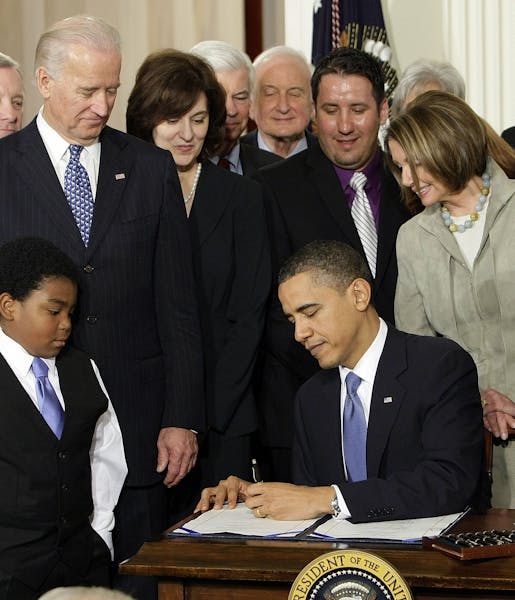Virginia Gilbert's phone rang one morning in August. The caller ID flashed a Florida area code. The man on the line told Gilbert that the Affordable Care Act was about to take effect and they needed to send her a new Medicare card.
The man read out her name, address and phone number. Gilbert told him all that was correct. He just needed a few more pieces of information: her bank name and bank account number.
She knew then it was a scam.
"I listen to the news and read the paper and if Medicare was really sending out new cards, it would have been in there," said Gilbert, who's 82 and lives in Anoka. "They probably thought this little old woman probably doesn't know what is going on."
While Gilbert got away unscathed, scammers think they can cash in on the confusion swirling around the rollout of the Affordable Care Act. The telephone is their most popular weapon as they put an Obamacare twist on the classic replacement insurance card con. In some states, such as California, officials are telling residents to beware of fake health insurance exchange websites. In New York and Florida, swindlers have been traveling door-to-door, threatening prison time for uninsured individuals if they do not sign up for coverage on the spot.
In Minnesota, MNsure and the state Department of Commerce are ready to respond to fraudulent activity associated with the new health insurance exchange. The Better Business Bureau of Minnesota and North Dakota last week urged consumers to watch out for phone calls telling them they have to provide personal or financial information.
"Medicare scams are one of the oldest hoaxes, but this is just another angle," said Dan Hendrickson, spokesman for the Better Business Bureau of Minnesota and North Dakota. "As much as Obamacare has been in the news, we're still learning about it, and it's going to take a while for it to all sink in."
'I felt like a damn fool'
The number that showed up on Gilbert's caller ID was 305-890-1654. The phone number is spoofed, meaning the caller has succeeded in masking the real number. An online search of the number revealed dozens of stories similar to Gilbert's. One woman wrote on an online forum, "I figured early on that it could be a scam. I even said, 'How do I know this is not a scam?' It ended with the person insulting me and suggesting I hang up if I don't want a new Medicare card."
Rose Wright, who's 83 and lives in Cincinnati, also received the Florida call. Unlike Gilbert, Wright fell for it.
Wright said she was sound asleep when her phone rang in July. She picked up, in a daze from sleeping pills. On the line was a woman who verified all of Wright's basic information and then asked Wright for her bank information. The woman said that if Wright didn't provide it, she would lose her Medicare coverage. Wright gave it to her.
"I wasn't all there that morning," Wright said. "I am a pretty sharp old lady, and I felt like a damn fool because you don't give that information over the phone."
Wright said she called the Social Security office right away to verify they had called her. When they told her she had been scammed, she canceled her bank account before they were able to take any money from her.
Wright said she reported the call to the U.S. attorney general's office.
Safeguards against scams
Seniors are not the only ones susceptible to confusion with the new law. A Kaiser Health Tracking Poll in late August showed about half of the public still does not understand how the law will affect them and their families.
MNsure officials said they are training key personnel, including those in the Contact Center, to handle inquiries about suspected MNsure impostors. They also set up an e-mail address where consumers can report fraud, abuse and ethical violations: mnsurecompliancehotline@mnsure.org. MNsure plans to forward reports of suspected fraud to the Department of Commerce, Health or other appropriate agency to investigate.
"Commerce urges all consumers who feel that they have been taken advantage, or have family members that have been scammed, to contact the department," said Anne O'Connor, Commerce spokeswoman. "Commerce will take immediate action to stop any incidents of criminal activity, scams or fraud against seniors and other consumers related to insurance products including those purchased through MNsure."
The BBB says consumers should note there is no card given out by the government under the Affordable Care Act. Medicare cards are not affected by the law.
If a senior falls victim to the Medicare scam, Attorney General Lori Swanson's office advises contacting all three major credit bureaus and placing a fraud alert on your credit report. Consumers also should monitor financial accounts for suspicious activity. Anyone who has received a Medicare scam call should report it to the Social Security Administration and Medicare, according to Swanson's office.
M. Kathleen Amble, 74, of St. Paul, also got the Medicare scam call, but the caller hung up when she started asking questions. Still, Amble wants more publicity about the potential for fraud during the scramble to set up the health exchange.
"I'm very supportive of the new health care law, but I'm disappointed that they launched the exchange in September when people need to start buying insurance in October," she said. "There hasn't been enough information out there about the potential scams. There has to be a way for them to look ahead and warn people."
Alejandra Matos • 612-673-4028 Twitter: @amatos12

A tale of 124 hoarded Minnesota cats has at least a hundred happy endings

Walz, St. Paul leaders urge support for copper wire theft bill: 'We've got to get in front of it'
Body of missing canoeist, 15, recovered from southwest Minnesota lake

High winds flipped a FedEx truck traveling on Bong Bridge in Duluth

